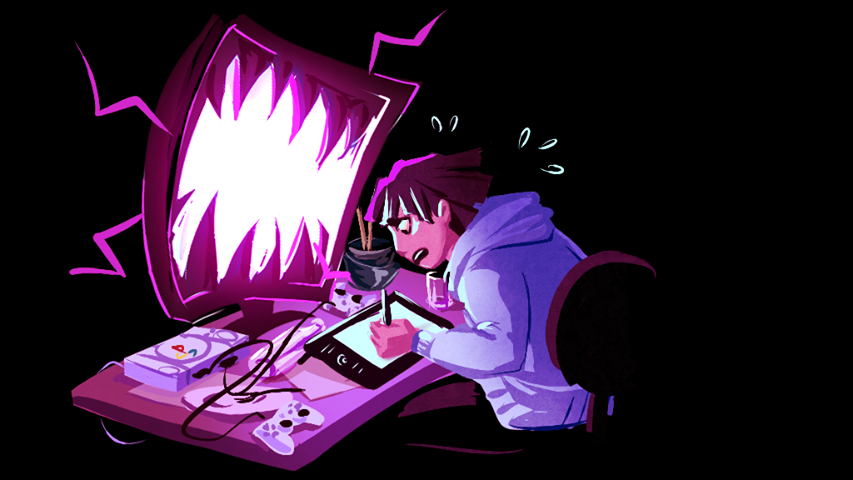The creation of video games have evolved from a collection of small computers whirring away in someone’s garage to a multibillion dollar industry. To work in today’s video game industry, is to work at the crossroads of art and technology. Game developers work on projects ranging from small indie titles to blockbuster mega-hits. They all share one thing in common though — an intense passion to create.
Yet, what does a creator do when tasked with extreme working conditions, ranging from 100-hour workweeks to sudden studio closures? For an art form at its financial peak, the video game industry is struggling to deal with problems such as these, all filed under the term “crunch culture.”
What is Crunch?
John Veneron is a producer-in-resident at the MAGIC Center; he helps students and provides them guidance in developing their own projects. He has worked for companies such as Harmonix and Runic Games, but now spends his time helping other students find their own passion.
Vernon described what exactly a game crunch is as well as his own first hand experience with it.
“[It’s] extended work hours, greater than 50 a week, for a prolonged period of time.” He continued, “I was a QA tester on the first ‘Rockband.’ We were easily doing 60- to 70-hour weeks from July until the game was released in September.”
Such schedules are not an uncommon practice in the games industry, with nights and weekends often being on the line for employees. A lot of times, these extra hours have to be worked due to the unpredictability of game development and tight deadlines imposed by both video game fans and companies on release dates.
Barrington Campbell, a fourth year Game Design and Development major who has represented RIT multiple times in national game development showcases, thinks these self-imposed deadlines are a fairly large part of the problem.
“Software customers are more lenient when it comes to getting the product out on certain days, but the gaming community is rough. Most [fans] don’t even know what’s going into their games.”
Even in these harsh working conditions, workers generally don’t expect much in return, whether it be profits or loyalty from their companies. The only thing that drives them is their own passion.
Though, some people find that these tougher working conditions do have benefits to go with the harder-to-swallow human costs.
Jacob Kemp-Schneider, a second year Game Design and Development major, stated, “Crunching is a grey area, because it increases productivity immensely, along with being extremely taxing.”
“Crunching is a grey area, because it increases productivity immensely, along with being extremely taxing.”
Creative Careers in an Emerging and Cash-Filled Field
The games industry is in a strange place currently. Still relatively young, the field is filled with passionate artists. Even with huge amounts of money on the line, lower-level employees are much more interested in making unique pieces of art than they are financial successes.
Campbell worries how crunching may affect art.
“It degrades quality. At some point, you’re going to get burnt out. The human body isn’t made to work 24 hours, 24/7,” Campbell said.
Veneron also thinks the young age and wild west-like management style of the current games industry may be playing a part in the crunch epidemic.
“[Developers] don’t get into the industry to run a business, they get into the industry to work on a passion project or make games,” he said.
When a rather niche industry, like the video game industry, suddenly explodes in popularity, it’s often unprepared and inexperienced developers who are put in charge of large groups of people. They often don’t know how to tackle the more business- and planning-oriented problems of running a company or division, and this can lead to issues such as crunch.
Fans themselves may also be contributing to the problem. Many of them aren’t even certain what a game developer does; they often assume it’s a simple and fun job that requires more work than play.
Kemp-Schneider puts these misguided beliefs best.
He said, “When you look at the games industry from the outside, it looks like sunshine and rainbows. It’s just a job like any other though. There are ups and downs and things that make it difficult.”
He finds crunch to just be one of those difficulties.
Planning Ahead: Tomorrow and the Future
Various solutions to the crunch epidemic have been passed around the games industry. Some work in the shorter term, while others take a broader, more long-term approach.
Campbell and Veneron think crunch starts with those in charge and only trickles down to workers as an aftereffect.
“In most cases, it’s misplanning that creates crunch. When planning isn’t done properly, employees will have to crunch because of that,” Campbell believed.
“In most cases, it’s misplanning that creates crunch. When planning isn’t done properly, employees will have to crunch because of that.”
Veneron agrees, and furthermore thinks that if a studio has to crunch, their superiors should be right there with them. Once he was in a position of power within the industry, he made sure that certain guidelines were put in place for both his own and his workers’ sake.
“When I was leading production on ‘Dance Central Spotlight’ and ‘Rockband 4,’ we were not doing weekend days. That was important to me.”
Veneron made the active choice, as a higher-up, to avoid weekend crunch because he didn’t believe it was helpful. He also knew it was something he wouldn’t want to do, so he believed it was only fair his staff shouldn’t have to either.
Others think that, while currently an extreme view, unionizing may be the future. There are various grassroots campaigns looking to do so, but currently they are in the minority.
Kemp-Schneider, while believing unionizing would have positive effects on the industry, is still pessimistic that the idea could take off due to the games industry being such a competitive field.
“There are always people willing to go in. You can’t unionize something that’s able to be so easily replaced,” Kemp-Schneider stated.
Catching up With Crunch
Opinions on crunch correlate heavily to the amount of time spent in the industry. Whether this has to do with having a firm enough footing to disagree with other important figures or with life catching up with developers, it is up in the air.
“The older I get, the less tolerant I am of making those sorts of sacrifices, especially for a video game,” Veneron stated. “If the stakes were higher, like solving climate change or something, I think sacrificing that work-life balance would be much more palatable.”
Campbell is starting to develop a similar mindset. In the past, he would have believed crunch was inevitable. During his times on co-op though, he’s met numerous mentors who are not willing to crunch for the industry, and through them he’s begun to change his mind on how necessary crunching really is.
Kemp-Schneider though, has yet to enter the field, but is preparing to crunch once he does.
He stated, “Right now, [crunch] is something that comes with the industry. It’s unavoidable. If you want to go into games, you have to expect it.”
Overall though, things are looking positive for concrete change in the industry. Social media is making everyone, including other developers, fans and the general public, more aware of crunch than ever before. And from a more extreme point of view, as the industry continues to increase in size, it becomes much more likely that a union or the government itself may step in.
Burnt-out men and women don’t make for the most productive workforce, yet the job does need to get done. Veneron believes there has to be a middle ground.
“The word sustainable is interesting and important here. I think there are sustainable development practices that can be put in place that both improve the quality of life for people working in the industry and make for a good game. I think it is possible,” he said.







